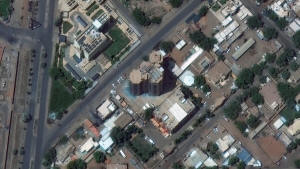WHO warns Sudan's hospitals running out of supplies, staff
 Send a link to a friend
Send a link to a friend
 [April 19, 2023]
By Gabrielle Tétrault-Farber and Raghav Mahobe [April 19, 2023]
By Gabrielle Tétrault-Farber and Raghav Mahobe
GENEVA (Reuters) -The World Health Organization's chief called on
Tuesday for the parties in the conflict in Sudan to provide access to
medical facilities to all those requiring care, warning that medical
supplies and personnel in the capital are running low.
"I want to be very clear: All parties must ensure unrestricted and safe
access to health facilities for those injured and everyone in need of
medical care," WHO director-general Tedros Adhanom Ghebreyesus told a
media briefing.
His comments came shortly after Sudan's rival commanders agreed a
24-hour ceasefire from Tuesday evening after pressure from U.S.
Secretary of State Antony Blinken over the fighting that has engulfed
the capital Khartoum.
The United Nations has warned of a humanitarian crisis in the country,
including the near collapse of the health system.
Tedros said some hospitals were already closed or on the brink of
shutting due to attacks and a lack of personnel and medical supplies.
Some health facilities were reportedly being looted and others being
used for military purposes, he said.

Supplies distributed to health facilities before the recent escalation
of the conflict were exhausted and hospitals in the capital Khartoum
were reporting shortages of personnel and life-saving medical supplies,
he said.
[to top of second column]
|

Satellite image shows a damaged hospital
in Khartoum, Sudan April 17, 2023, in this handout image. Courtesy
of Maxar Technologies/Handout via REUTERS.
 In separate comments earlier on
Tuesday, the WHO said it had documented three attacks against
healthcare facilities since the fighting erupted in Sudan, one of
which had killed at least three people.
"Attacks on health care are a flagrant violation of humanitarian law
and the right to health, and they must stop now," WHO spokesperson
Margaret Harris said.
Blackouts were making it difficult to render basic services, she
said.
"It's so dangerous for anybody to move anywhere, which is making it
so difficult for staff to actually get to the hospitals," she said.
(Reporting by Gabrielle Tétrault-Farber in Geneva and Raghav Mahobe
in Bengaluru; writing by Josephine Mason,Editing by Peter Graff and
Ed Osmond)
[© 2023 Thomson Reuters. All rights
reserved.]This material may not be published,
broadcast, rewritten or redistributed.
Thompson Reuters is solely responsible for this content. |